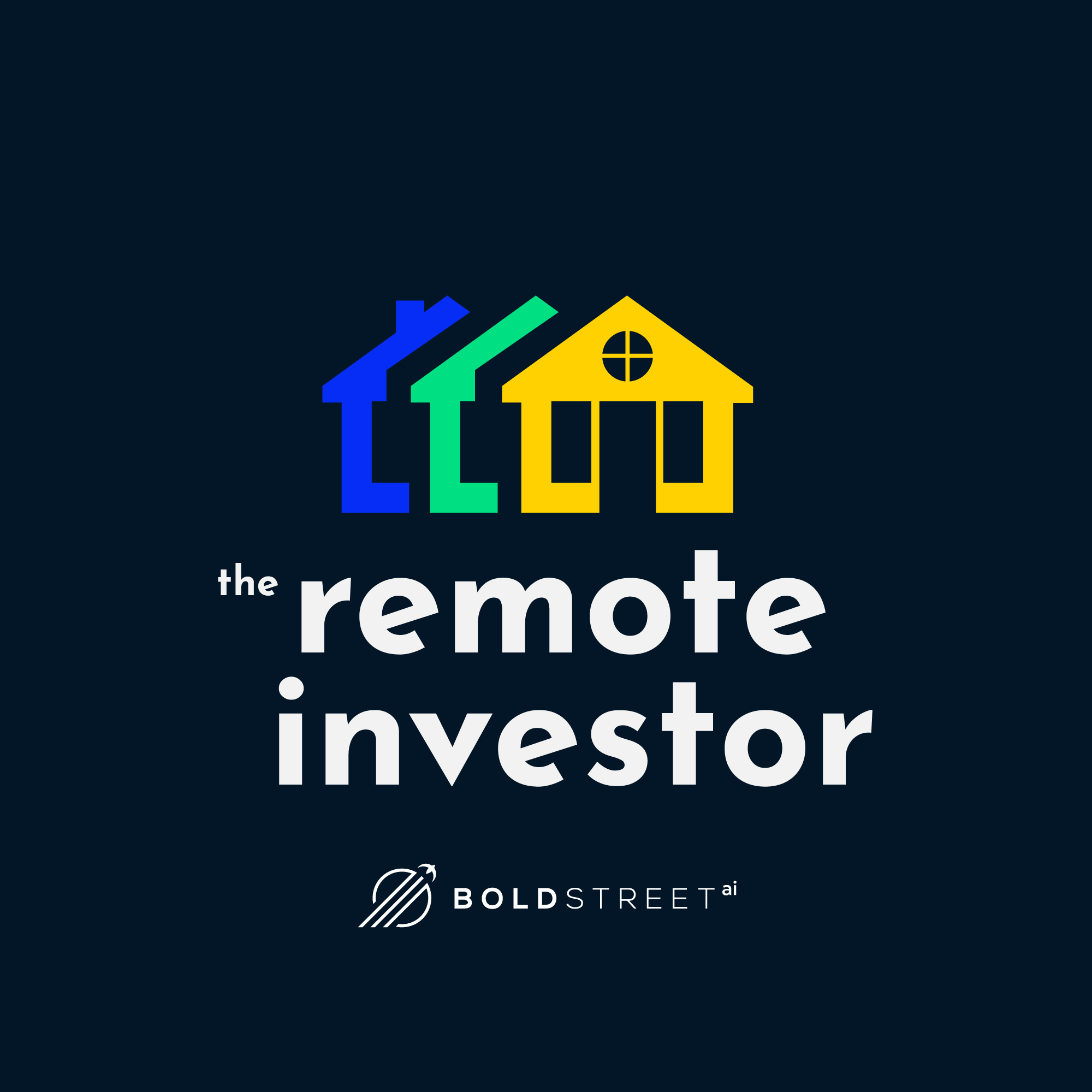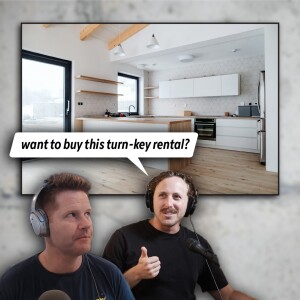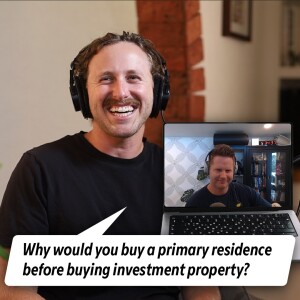The Remote Investor

Welcome to The Remote Investor, an ongoing conversation on the topic of building wealth through real estate. Hosts Michael Albaum and Pierre Carrillo discuss the messy world of owning rental properties in remote locations. Whether you’re a seasoned investor or just trying to break through the barriers to entry, this podcast is your go-to resource for invaluable knowledge gained through hands on experience. The Remote Investor is brought to you by Boldstreet.ai
Welcome to The Remote Investor, an ongoing conversation on the topic of building wealth through real estate. Hosts Michael Albaum and Pierre Carrillo discuss the messy world of owning rental properties in remote locations. Whether you’re a seasoned investor or just trying to break through the barriers to entry, this podcast is your go-to resource for invaluable knowledge gained through hands on experience. The Remote Investor is brought to you by Boldstreet.ai
Episodes
Episodes



Tuesday Aug 27, 2024
The Minimum Cash Needed to Start Investing in Real Estate
Tuesday Aug 27, 2024
Tuesday Aug 27, 2024
In this episode, we break down the true costs of getting started with remote real estate investing. We explore essential expenses like the 20% down payment, closing costs, and the often-overlooked costs such as property taxes, insurance, and management fees. We also discuss why having a reserve fund of $5,000-$10,000 is crucial for unexpected repairs and maintenance. Plus, we highlight the role of tax professionals, the importance of setting up an LLC, and securing the right insurance to protect your investment. Tune in to get a clear picture of what it takes to begin your real estate journey from afar.
Brought to you by https://www.myfiacademy.com/



Tuesday Aug 20, 2024
Is it time to refinance yet?
Tuesday Aug 20, 2024
Tuesday Aug 20, 2024
Dan Frio has been in the mortgage business since 1990 and hosts a radio show that can be heard on WYLL 1160 AM Chicago Christians Talk Radio, "The Mortgage Update" Weekdays from 7:30-8PM.
In today’s episode Dan shares his view on the current state of interest rates and their impact on housing market conditions. Dan first explains the Federal Reserve's role in shaping mortgage rates. He then shares his perspective on the current refinancing environment. We discuss the importance of understanding market conditions, finding the right loan officer, and selecting a reliable and knowledgeable mortgage broker to navigate the mortgage process.
Dan Frio’s Channel
https://www.youtube.com/@TheRateUpdatewithDanFrio
Brought to you by myfiacademy.com/



Tuesday Aug 13, 2024
Do not sell your home when you move out!
Tuesday Aug 13, 2024
Tuesday Aug 13, 2024
Michael and Pierre discuss various considerations for converting primary residences into rental properties, including tax advantages, challenges, and entity structure. They also explore insurance coverage, utility management, and financing options. Michael emphasizes the benefits of self-management and cash out refinancing and provides valuable insights into the decision-making process for managing rental properties.
Brought to you by https://www.myfiacademy.com/



Tuesday Aug 06, 2024
Geoff Stuhr on the quest to create passive income
Tuesday Aug 06, 2024
Tuesday Aug 06, 2024
In this episode, we host private equity fund manager, real estate investor, and podcast host Geoff Stuhr. We discuss his experiences and insights on real estate syndication, highlighting the lessons learned and challenges faced in this field. Geoff emphasizes the importance of transparency, mentorship, and team building to scale a successful business. He shares his challenges with private equity investing in industrial real estate, including managing assets, meeting pro forma expectations, and navigating market conditions. He shares his investment strategies, approaches to diversifying portfolios, and the importance of thorough due diligence and communication with experts.
See more of Geoff:
https://www.youtube.com/@WinningWealthPodcast
https://www.linkedin.com/in/geoffstuhr/
https://www.smartassetcapital.com/



Tuesday Jul 30, 2024
Turnkey Rentals: Outstanding opportunity or dangerous investment?
Tuesday Jul 30, 2024
Tuesday Jul 30, 2024
In this episode, Tom and Michael discuss the pros and cons of investing in turnkey rental properties. They highlight the convenience of having a tenant already in place and the potential for a more “passive” income, but also acknowledge the lack of control over setting up the property, and the potential hidden fees. They also discuss red flags and risks associated with turnkey real estate investments, such as overlooked repair and maintenance costs, and the need for thorough due diligence on both the property and the turnkey provider. Michael, emphasizes the importance of grounding investment decisions in reality rather than relying solely on spreadsheets or projections.
Brought to you by myfiacademy.com



Tuesday Jul 23, 2024
Refinance or HELOC? Make the right choice for your investment.
Tuesday Jul 23, 2024
Tuesday Jul 23, 2024
Tom and Michael discuss using cash-out refinancing and HELOCs for investing in real estate. They explore the pros and cons of each option, considering loan-to-value ratios and timing for optimal financial outcomes. They also delve into the HELOC process, payments, and payment structure, highlighting the importance of understanding the mechanics of using a HELOC. Both Tom and Michael share their personal experiences and insights on refinancing and HELOC strategies, providing valuable information for real estate investors.
Brought to you by myfiacademy.com



Tuesday Jul 16, 2024
Maximizing Tax Benefits: Primary vs Investment Property Comparison
Tuesday Jul 16, 2024
Tuesday Jul 16, 2024
In this episode, we explore the tax benefits of primary residences versus investment properties. We highlight the mortgage interest deduction cap for primary residences and the lack of such a cap for investment properties. We also discuss house hacking, where individuals buy properties with extra units and rent them out to reduce living expenses.
Additionally, we cover strategies to maximize real estate investment benefits, such as buying down points to lower monthly payments, converting primary residences into investment properties, and alternative approaches blurring the line between rental and investment property.
Key points:
Consult a tax professional before making tax-related decisions.
Understand capital gains tax exemptions for married couples filing separately.
Consider converting an existing primary residence into a rental when buying a new one to keep tax benefits and leverage the existing property



Tuesday Jul 09, 2024
DEBATE: Primary Residence vs Investment Property
Tuesday Jul 09, 2024
Tuesday Jul 09, 2024
In this episode, Tom and Michael hash it out over the topic: Should you buy a primary residence before purchasing an investment property, or should you invest in real estate first before settling into your own home? Through this debate we explore unique advantages and challenges of each approach, bringing in insights from our experiences as real estate investors.







